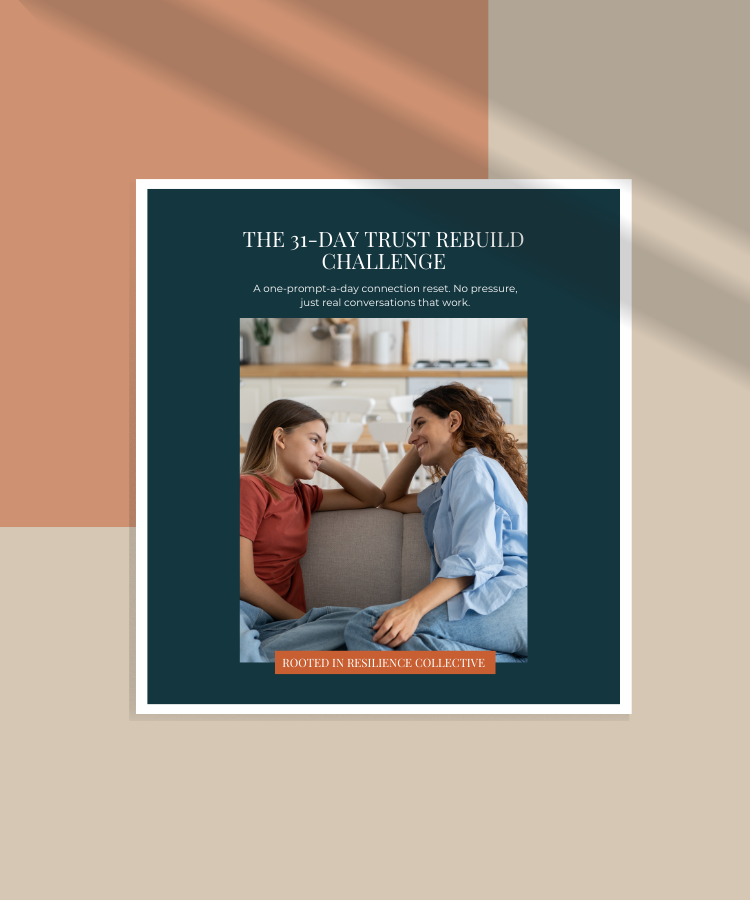Are They Playing the Victim or Carrying Shame? What Moms of Teens Need to Know

If you’ve ever thought…
“My teen doesn’t take responsibility.”
“They just shut down and act like the victim.”
“I’m afraid I’ve made it too easy for them and now I’ve messed them up.”
You are not alone.
This is one of the most common spirals I hear from moms inside my coaching practice.
It usually sounds something like this: “My teen made a mistake. I tried to correct it. But instead of taking ownership, they just shut down. I don’t think they even heard me. And now I’m stuck wondering if I’ve created this dynamic—if it’s my fault they can’t own their stuff.”
Beneath that frustration? A deeper fear.
The fear that your teen will become an adult who never takes responsibility. That they’ll stay stuck in victim mode forever. That you’ve failed to give them the structure, accountability, or correction they need.
I want to pause here and offer a reframe: Because what often looks like playing the victim on the outside…might actually be shame and shutdown on the inside.
What’s Really Going On When Teens Shut Down After Conflict
Here’s what I see so often in teen-parent dynamics:
Your teen already knows they messed up.
They’ve been beating themselves up for it since it happened.
They’re flooded with thoughts like:
“I can’t do anything right.”
“I keep disappointing my mom.”
“I’m the problem.”
And then when a parent reacts with intensity—yelling, lecturing, snapping to get the message across—it reinforces that inner script. Instead of helping them take ownership, it sends them deeper into defeat.
What we interpret as defiance or victimhood might actually be self-blame in disguise.
Moms Aren’t the Problem. But Our Reactions Still Matter.
Here’s the tension point: You want to raise a teen who takes responsibility.
But when you feel like they’re not listening, your instinct is to react harder—to say it louder, say it stronger, or shut it down completely.
Then the spiral starts. You feel guilty. You wonder if you overreacted. You question if you’re doing it all wrong.
That’s where I want to introduce a new invitation: What if your teen isn’t playing the victim? What if they’re just overwhelmed with shame, fear, and pressure they don’t know how to name?
What Would Change If You Assumed the Best?
Let’s get honest: You’re doing your best. So is your teen.
What if both of you need more permission than punishment? More repair than reprimand? More benefit of the doubt, even when the moment is messy?
This doesn’t mean letting your teen off the hook. It means choosing to believe their behavior is communication, not character.
When you assume the best, it opens up space for:
- Connection before correction
- Curiosity instead of control
- Shared responsibility (not blame dumping)
And that shift starts with you.
What It Looks Like to Model Ownership and Repair
If your teen made a mistake, it’s okay to name it. But how you correct them matters just as much as what you say. You can try something like: “Hey, I know you’re already feeling bad about what happened. I’ve messed up before too. Let’s talk about how we move forward.”
Or even: “I may not have said that in the best way earlier. What I want you to hear is: I care about you. I want to help you grow.”
Modeling repair doesn’t make you weak. It teaches your teen how to take responsibility without shame. It also invites them to extend you grace, too.
When We Assume the Worst, Everyone Loses
If you constantly assume your teen is lazy, selfish, or manipulative…you’ll start to see them that way. And eventually, they’ll see themselves that way too. That’s the self-fulfilling prophecy so many moms want to break.
So here’s the question:
What shifts when you assume the best about your teen
...even when they mess up?
...even when they shut down?
...even when it would be easier to yell?
And what shifts when you assume the best about yourself too?
You’re Not Failing. You’re Being Given a Chance to Lead Differently.
There is no perfect parenting formula. But there is a way to lead with calm, rebuild trust, and reconnect, even after conflict.
It starts with:
- Checking your own nervous system before reacting
- Naming the shame underneath the shutdown
- Assuming the best before assigning blame
- Modeling ownership instead of demanding it
You’re not raising a “professional victim.” You’re raising a human being who is still learning.
So are you.
🎧 Want to Hear This Talked Through?
Stay tuned for a podcast episode coming soon on this exact topic.
Until then, come reflect with me on Instagram @parentingwithabi.
And if this message resonated? Rooted 1:1 Coaching was built for you.
Book your free Clarity Call here
Or DM me the word ROOTED and I’ll send you all the details.
You’re not behind.
You’re just learning to parent from a more rooted place.
—
Abi Brown
Parenting Coach & Host of Root to Ring: A Resilient Parenting Podcast



